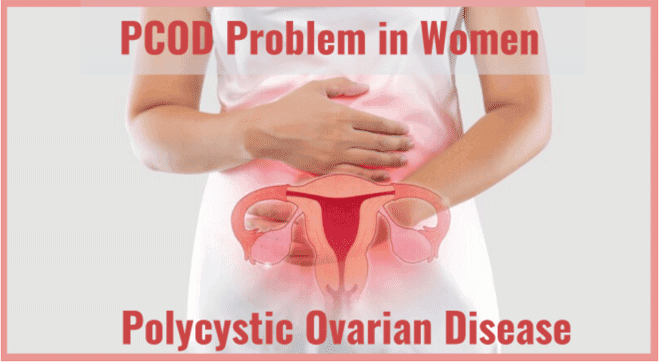What is PCOD (Polycystic Ovarian Disease)?
Polycystic Ovarian Disease (PCOD) is one of the most common reproductive health hazards in women caused due to a combination of hormonal imbalances and genetic tendencies. In PCOD, your ovaries tend to release premature or immature eggs that might turn into cysts, causing hormonal imbalances. The level of male hormones (androgens) tend to surge in your bloodstream, which may cause complications and side effects, such as abnormal hair growth on the face and body, irregular menstruation, weight gain and infertility in extreme cases. This is what happens in PCOD.
Bilateral Polycystic Ovarian Disease is the condition in which both the ovaries develop cysts, multiplying the complications and side effects of PCOD. Mild PCOD is a condition in which the cysts in the ovaries are either minimal or don’t cause much harm in terms of irregular periods and other health complications.
Did you know:
- PCOS affects an estimated 8-13% of reproductive-aged women, making it a significant public health problem and one of the commonest hormonal disturbances affecting women of reproductive age
- Up to 70% of affected women are undiagnosed
- PCOS is a health problem that affects 1 in 10 women of childbearing age
- PCOS is a leading cause of infertility, and irregular periods, usually with a lack of ovulation, can make it difficult to become pregnant
- Women with PCOS are often insulin resistant, which increases their risk for type 2 diabetes
- PCOS is a chronic condition and cannot be cured. However, some symptoms can be improved through lifestyle changes, medications, and fertility treatments
PCOD and PCOS – Similarities and Differences
Are you wondering what is PCOS and PCOD and is PCOD and PCOS the same? Though referred to interchangeably, PCOD and PCOS are not the same. While PCOD is caused by a combination of hormonal imbalances and genetic predispositions, PCOS (Polycystic Ovarian Syndrome) is a chronic endocrine system disorder that has more serious implications.
The key differences between PCOS and PCOD include:
|
PCOD |
PCOS |
|
PCOD, or Polycystic Ovary Disorder, is characterized by the production of numerous immature or partially mature eggs in the ovaries, often resulting in the development of ovarian cysts. This condition typically arises due to a combination of hormonal imbalances and genetic predisposition. |
PCOS, or Polycystic Ovary Syndrome, is a metabolic-endocrine disorder characterized by elevated levels of male hormones produced by the ovaries. These hormonal imbalances can result in irregular menstrual cycles, acne, and increased hair growth. It’s important to note that PCOS is a more severe condition compared to PCOD. |
|
Polycystic Ovarian Disease is a moderate and manageable condition |
Polycystic Ovarian Syndrome is a more serious condition |
|
Caused due to hormonal imbalances and genetic tendencies |
Caused due to endocrine system dysfunctions |
|
10% of global women tend to experience PCOD at some point in their lives |
0.2 to 2.5% of global women tend to experience PCOS at some point in their lives |
|
Can be managed by informed lifestyle changes |
Lifestyle changes alone might not suffice |
|
External hormone treatment is not needed |
External hormone treatment is a must |
|
PCOD may or may not cause fertility problems |
PCOS is a leading cause of infertility in women |
Symptoms of PCOD
In certain instances PCOD problem symptoms might be confused with other healthcare conditions and complications. It is essential to beware of and watch out for some of the widely acknowledged symptoms of PCOD, such as:
- Irregular menstruation
- Heavy period flows
- Acne breakouts on the skin of the face and neck
- Abnormal hair growth in women, giving away a men-like appearance
- Excessive weight gain
- Crown baldness, receding hairline and pattern baldness in females
- Skin darkening
- Headaches
Causes of PCOD
PCOD problems in females are quite common and may occur at any time after they reach the puberty age. By understanding why PCOD occurs, women can seek the right treatment, management and preventive interventions to lead a good quality of life.
Some of the key reasons for OCOD are:
- Genetic predisposition
- Insulin resistance
- Obesity
- Chronic inflammations
- Excess insulin and androgen hormone concentration in the body
Who is at Risk of PCOD?
Some of the common risk factors for PCOD problems in females are:
- Type 1 diabetes
- Type 2 diabetes
- Gestational diabetes
- Obesity
- Family history
- Sedentary lifestyle choices
Complications of PCOD When Left Untreated
Some of the common complications of PCOD include:
- Diabetes
- Impaired glucose tolerance
- Infertility
- Cardiovascular diseases
- Obstructive sleep apnea
- Depression and anxiety
- Endometrial cancer due to defunct ovulation and endometrial lining thickening
- Non-alcoholic fatty liver disease/non-alcoholic steatohepatitis
Diagnosis of PCOD
Wondering how to know if you have PCOS? Opting for PCOD profile blood tests can help your healthcare provider diagnose PCOD and assess your risks of developing the same.
Some of the key diagnostic tests leveraged for PCOD assessment include:
- Medical history analysis
- Pelvic exam to look for tumours in the reproductive organs
- hormonal imbalance test to assess low Follicle stimulating hormone, high luteinizing hormone, high testosterone, high oestrogen, low sex hormone binding globulin
- Blood Pressure Tests
- Thyroid Proflie Test
- Glucose tolerance tests
- Lipid profile test
- Ultrasounds for analysing cysts in ovaries – texture, volume, and uterine lining thickness
- Depression and anxiety screening
- Obstructive sleep apnea screening
PCOD Management and Treatment
How To Cure PCOD Permanently – this is probably the most commonly asked question by women with PCOD or are at a risk of the same. In a nutshell, PCOD can’t be cured permanently but can be managed with optimal and appropriate interventions.
Medical Treatment for PCOD
Some of the key PCOD problem treatments include:
- Administration of Birth control pills and hormone meds
- Infertility treatments
- Treatments for hyperandrogenism
- Cyclic hormonal treatments
- Laparoscopic surgeries
- Meds for regulating menstruation, promoting ovulation, and reducing abnormal hair growth
These medical PCOD problem solutions and some of the best treatments for PCOD should be sought after a conclusive consultation with your healthcare provider. For specialised PCOD cures, do consult your healthcare provider.
Home Remedies and Lifestyle Changes
Are you wondering how to cure PCOD problem permanently at home? While this may seem far-fetched, by opting for some of the time-tested home remedies for PCOD, you can find a polycystic ovarian disease cure.
Make lifestyle changes to manage and prevent PCOD problems.
- Opt for a healthy and balanced diet
- Stay physically active
- Avoid sedentary lifestyle choices to keep lifestyle disorders, such as obesity and high BP and cholesterol at bay
- Opt for routine blood test and imaging tests to assess the risk of PCOD as well as the progress of treatments if you are undergoing any.
PCOD complications or PCOD side effects can be managed by understanding the triggers and seeking the right PCOD interventions.
Diet for PCOD
Diet plays a crucial role in influencing the occurrence, prevention and management of PCOD as it is directly linked with obesity and weight gain and other lifestyle disorders that are prime suspects for PCOD.
The diet for a PCOD patient should include fresh fruits, leafy green and orange vegetables, seeds, cereals, pulses, dairy products. Red meat, saturated, and hydrogenated fats, sugary foods and drinks and refined cereals should be avoided as much as possible.
Conclusion
PCOD is the most common reproductive health hazard that has been impacting women across the globe. Understanding the causes, symptoms, risk factors and complications and opting for the right PCOD treatment in terms of medical management and home remedies is crucial.
We at HealthcareOnTime can assist you in your PCOD care journey by offering At-home PCOD profile test, blood testing, imaging tests and female hormone imbalance tests and overall female profile testing with Thyrocare Aarogyam Female Profile Test with 101 parameters at the comfort of your home in the most convenient and cost-effective manner.
Disclaimer: The information listed here is strictly for educational purposes and is not intended to offer personal medical advice. Do consult your physician for any questions you may have regarding a medical condition. It’s not advised to disregard professional medical advice or delay in seeking it because of any information listed here. The Nutrition Source does not recommend or endorse any products.
Sources
Ref Links:









